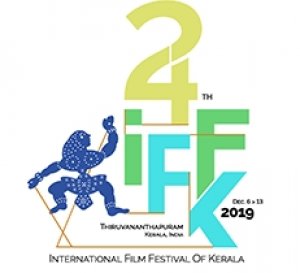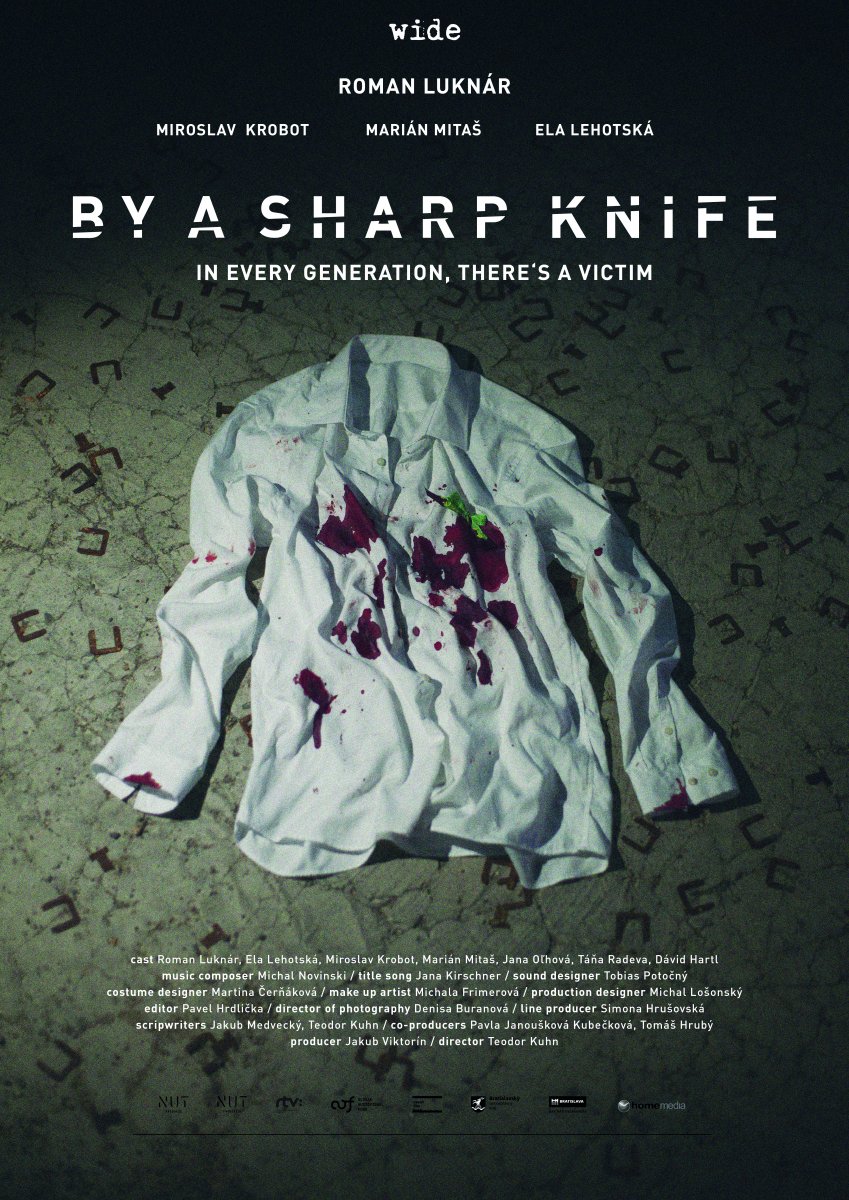
By A Sharp Knife
SHORT SYNOPSIS
A story of a father whose son has been murdered. Four perpetrators are charged with the crime, but thanks to an erroneous court ruling, they soon get to walk free. Determined to uncover the truth, the father enters into an uneven struggle with a passive police force, a corrupt judiciary and a dominant mob. Can he prevail in such a crooked system.

ABOUT THE FILM
By a Sharp Knife tells the story of a father who has to bury his child. Besides the tragic event itself, he has to cope with media attempts to tarnish his son’s name, the indifference of the police and his own sense of guilt. He gradually learns more about the incident and sets out to uncover the truth on his own. However, it seems unlikely that his son’s murderers will never be punished. Can he at least forgive himself?
By a Sharp Knife is inspired by the murder of a young student committed in 2005 by a group of neoNazis. The police launched a manhunt for the perpetrators, and civil society rose up in protest. For some time, the streets of Bratislava seemed safer. But interest in the case soon waned, information became scarce, and the suspects were set free. What remained was a bereaved family desperately calling for justice and a group of criminals who continued to laugh in the family’s faces.
The film aims to open up this wound, which, apart from being of the most painful in modern Slovak history, is symptomatic of deeper problems in our society. Against the backdrop of a compelling narrative, the film seeks to initiate a discussion on the issue of justice and its accessibility to common people.
4
When Daniel Tupý was killed, director Teodor Kuhn was about his age, and he hung out in an environment where conflicts with neo-Nazis were a fact of daily life. He heard a lot about the night when Daniel was killed. The injustice which followed is somehow even more tragic than the death itself.
Random acts of violence can never be fully eradicated. The dysfunctional system which prevents their punishment represents a far bigger problem. The death of Daniel Tupý affected my entire generation. Something of the sort can never repeat. By a Sharp Knife is inspired by this event and deserves its own story.
5
CREATIVE TEAM
TEODOR KUHN – DIRECTOR
• Why did you choose to develop your feature debut from a story inspired by a true event – the tragic death of Daniel Tupý?
When Daniel Tupý was murdered, I was just a few years younger than him. Every day, my friends and I skated in Janko Kráľ Park, which is only a few minutes' walk away from the place where Daniel died. There were countless times when we had to run from neo-Nazis, who were calling us junkies and anarchists, even though we didn't really know what those words meant. So, Daniel could've easily been one of my friends. He could've easily been me.
• Could you describe how you and screenwriter Jakub Medvecký worked on the script?
We wanted to approach the theme as responsibly as we could. For the first year, we were mostly meeting with people and trying to find out what exactly had happened. Few people today remember that the neo-Nazi assault was directed not only at Daniel, but at a whole group of students. A couple of them got stabbed that night. So, we talked to doctors, journalists, lawyers, experts, the victims as well as the perpetrators. I personally attended the trial where the mob boss Juraj Ondrejčák, also known as Piťo, heard his sentence. In person, he's an incredibly charismatic and witty guy. Before I started working on the film, I wanted to know as much as I could about the real background. By now, I know so much about the case that it has almost become a personal obsession of mine.
6
• Even years after the fact, the death of Daniel Tupý still resonates in Slovak society. What ultimately led you to dramatize the case, rather than shoot a biopic?
Despite the fact that I'm 95 per cent sure about what happened, there are some things about the case that I haven't been able to confirm. A policeman I met with anonymously told me that 'the whole truth about Tupý's case was written in the papers. You just have to read between the lines.' That wasn't enough for the purposes of our film. So, in the interest of truthfulness and honesty, I decided to fictionalise the story. That's how we ended up with scenes that are 100-per-cent authentic as well as scenes that are completely fabricated or borrowed from other cases.
• How did Daniel Tupý's family react to the fact that you had decided to adapt his story into film?
For me, meeting Daniel's parents was a truly humbling moment. We are making a film – we're just staging and acting things out – but they went through the loss in their real lives. For us, it's 'just work'. For them, it's something that caused their entire world to break apart. I have immense respect for them, and I feel responsible for the fact that we'd allowed our state to ruin their lives. I think we all owe them an apology, that we owe them five million apologies – one for each citizen of Slovakia. I saw them smile once, when we met to talk about the actors who were going to portray them in the film. The father, Daniel Tupý Sr., turned to his wife and said, 'Look, this guy's going to play me, and this woman is going to play you. He's a lot thinner than I am. That's good.' This film is my personal apology.
• What reactions have you had since the public found out that you were working on a film about Daniel Tupý? And what were the reactions of your friends and family?
In the beginning, when a lot of people involved in the case were still roaming free, we were a bit concerned. The witnesses were telling us that they were sometimes followed by certain black cars which only one group of people drove at the time. But later it all settled down. After the first hints about the project appeared in the media, I unfortunately came across a conspiratorial account of the story whereby Daniel Tupý was a drug dealer, and he deserved to die. I'm not going to go into the ethics of that argument, even if the premise were true. I have been able to trace this hoax to its author, and I can confirm that it was mostly propagated by the perpetrators themselves in an effort to downplay their guilt. In Slovakia, there are sadly a lot of people who are willing to buy into any banal conspiracy and even kick the victim of murder.
• By a Sharp Knife stars a whole cast of notable actors. Was it your intention from the beginning to populate the film's world with well-known faces? What were their initial reactions when you approached them with the project?
My whole life I mostly worked with amateurs and authentic people from the street. But in this film, I needed the bulletproof certainty of real acting, and I didn't want to take risks. Given the subject matter, the actors were very sensitive and always ready to meet my
7
requests. I really want to thank the cultural community for its willingness to help a good thing. I'm not just talking about the film itself, but about the support they have been giving to our country's pro-democratic movements, NGOs and citizen protests.
• The film is largely built around the main character of the father – Ľudo. How did you go about casting him? Was Roman Luknár an obvious choice?
Roman Luknár wasn't an obvious choice, but he was certainly the best one. The casting was very long, and I tried out about ten excellent actors. It's difficult to describe the breadth of Roman's talent and experience. Imagine a colleague at work who's always supportive and consistently improves upon your ideas. Any task you throw at him, he can tackle with peerless skill. I really hope we will get to work together again.
• Which scene was the most difficult for you as the director?
I don't have the emotional detachment of some directors. So, when we were shooting emotional scenes, like the parents desperately standing over the body of their dead son in the morgue, I felt terrible. I know that the result has to be authentic, but I always feel sorry about the state of mind that the actor has to get himself into. At times it was so hard, and we were so invested in the scenes, that we cried after we'd finished the shot. Then we pulled ourselves together and moved on.
BIO
Teodor Kuhn earned his Art.D. from the Film and TV Faculty at the Academy of Performing Arts in Bratislava. His directing and writing talent was evident already from his award-winning shorts. Apart from making films and commercials, Teodor is involved with the Slovak Skateboarding Association, for which he built the first concrete skatepark in Bratislava. He and his wife also helped revitalise the Škarniclova St. Park in Bratislava's Castle Heights. Furthermore, Teodor is involved with the Vĺčatá.sk initiative whereby he educates parents and teachers about digital technology and computer games. In his free time, he enjoys writing on Facebook, pouring concrete and doing voluntary work.
FILMOGRAPHY
I am Sorry, 2015: High Mountain Film Festival 2016, USA – Best Film, Best Script, MOV - International Student Film Festival of Pernambuco 2017, BRA – Best Foreign Film, Short to the Point 2017, RO – Best Student Film Momo, 2012: MIDPOINT workshop 2011 – Best Short Film Project, Rome Independent Film Festival 2013 – Best Student Film Project, Cinemaiubit International Student Film Festival Bucharest 2014 – Special Mention of the Jury 2014 Lost Children, 2011: Celtix Seeds 2 2012 – Grand Prix, Cluj Napoca International Film Festival 2012 – Best Foreign Short Film
